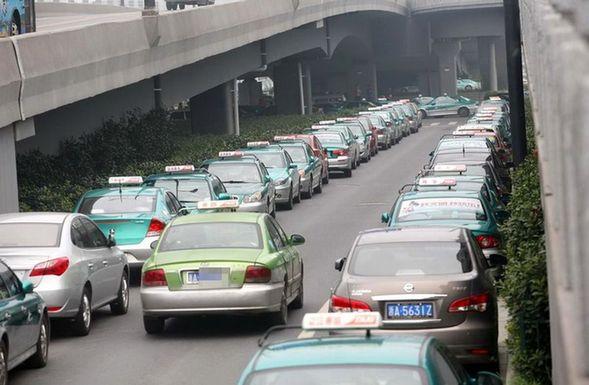
Local residents pass by taxis parked along a street on Monday. The drivers of the cabs have gone on strike over rising gasoline prices and road congestion in Hangzhou, capital of East China's Zhejiang province.
More than 1,000 disgruntled taxi drivers went on strike in the eastern Chinese city of Hangzhou on Monday, complaining about increasing gas prices and worsening traffic jams.
The strike started during the morning rush hour when hundreds of cab drivers drove taxis to different parts of downtown Hangzhou, a well-known tourist city and the capital of Zhejiang province. If they saw that any of their colleagues were still accepting passengers, they would at times ask them to stop and join the strike.
Local police were sent out to maintain order among taxi drivers, who were still on strike by Monday afternoon.
The drivers demanded that the cost of renting a taxi be decreased and that the amount of minimum fares be raised. They also wanted their regular operation costs to be lowered, referring mainly to the road maintenance fees and other expenses they must pay.
"We can hardly afford the high cost of running a taxi," said a 40-year-old taxi driver surnamed Zhou. "Besides, the difficulty in using the roads during traffic jams in peak hours has cut deeply into our income."
"My monthly income is about 3,000 yuan ($460)," he said. "That's not more than I made in my previous job working as a cleaner."
While taxi drivers complained about the high costs they are saddled with, Song Jie, a staff member at the Foundation Construction Department of the Hangzhou Finance Bureau wrote on a micro blog that Hangzhou pays the highest gasoline subsidies to taxi drivers in China.
In the second quarter of the year, the city's 8,100 taxis received 59.8 million yuan subsidies in total, but taxi companies sometimes hold on to the subsidies, he said.
The city governemnt announced on Monday that it will give drivers a subsidy of 1 yuan for each trip they take from Aug 1 until October, when a new taxi price policy will be introduced.





